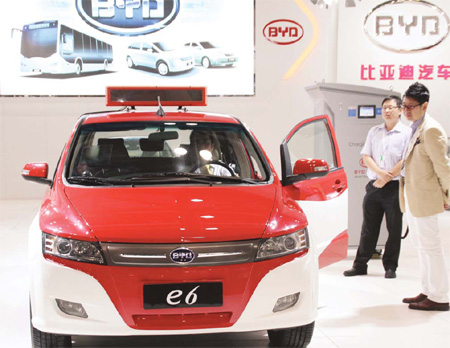Chinese car and battery manufacturer BYD Co is reporting an 89 percent fall in first-half net income due to sluggish sales. The Shenzhen-based company had just 275 million yuan in net income in the first six months of this year compared with 2.4 billion yuan a year ago.
Its vehicle sales between January and June dropped 23 percent from a year earlier to 222,000 units. The company said that expiration of government incentives for small cars and increasing competition are the main reasons for the sales plunge.
Yet analysts point out that it is also a result of BYD’s “blind pursuit of sales expansion” in the past few years and high inventory at its dealerships.
Exulting in explosive growth from 2005 to 2009, the company last year expected to continue the momentum and double its sales to 800,000 units, but eventually wrapped up the year with 520,000 cars delivered.
In the middle of last year, a number of BYD dealers quit the company’s network due to stagnant sales and high inventories. The company later admitted its expansion was too rapid and began to trim the bulky network.
BYD’s chairman Wang Chuanfu told a press conference last week that the company has cut the number of dealerships to about 800 from more than 1,000 at the peak of expansion.
BYD should move to slower, more stable growth, said Zhang Xin, automotive analysts at Guotai Jun’an Securities.
In addition to problems with its sales network, BYD’s aging models – the former best-selling F3 and F0 – have faltering competitiveness, analysts said.
BYD’s F3 compact used to be the best-selling car in China due to its pleasing exterior and attractive price, but now faces fierce competition from similar products made by domestic counterparts, said Lin Huaibin, an auto analyst at consultancy IHS.
Lin said BYD’s sales are unlikely grow significantly in the coming months. In fact he predicts a contraction in the company’s full-year sales compared to 2010.
Like most domestic automakers, the majority of BYD’s lineup is low-cost models, which already have the lowest profit margin of any segment.
Painful price cuts
Yet in February the company announced a price cut of up to 20 percent on five models.
Boosting volume by cutting prices definitely hurts profits, Zhang said. He warned that the company could be profitless or suffer losses on sales of the F0. He noted that in some cities the micro car was selling at just 30,000 yuan including the license registration fee.
Some analysts view BYD’s setbacks as temporary, saying a young company often makes mistakes and it just began producing sedans in 2003.
BYD is now trying to attract customers with new and more advanced models, including the S6 SUV launched in May. The model sold more than 3,000 units last month, and it will take time for it to gain more recognition from customers, analysts said.
They also note that the market is not ready for mass-produced electric vehicles, so BYD should invest more in traditional combustion engine vehicles to increase competitiveness and raise earnings.
Geely Automobile, another indigenous, non State-owned automaker whose parent company bought Volvo last year, reported a 17 percent increase in first half profit to 938 million yuan.
Geely moved 213,300 cars in the first seven months, up 9 percent from a year ago. The company said it aims to sell 480,000 vehicles this year.
Great Wall Motors, another homegrown, private enterprise, saw its strongest-ever growth in the first half of this year, an increase of 109 percent in net income to 1.8 billion yuan as sales surged 47 percent to 218,288 units.
Wei Jianjun, chairman of Great Wall Motors, said the company expects to maintain a double-digit growth in profit in the second half. “Our principle is no price cuts – we must maintain good profits,” Wei said.
But he said it will be difficult for the company to meet its full-year sales target of 500,000 cars.
In the first half this year, China’s passenger vehicle market edged up 5.8 percent to 7.22 million cars, according to China Association of Automobile Manufacturers. Growth slowed significantly compared with more than 30 percent last year.
Via: ChinaDaily.



